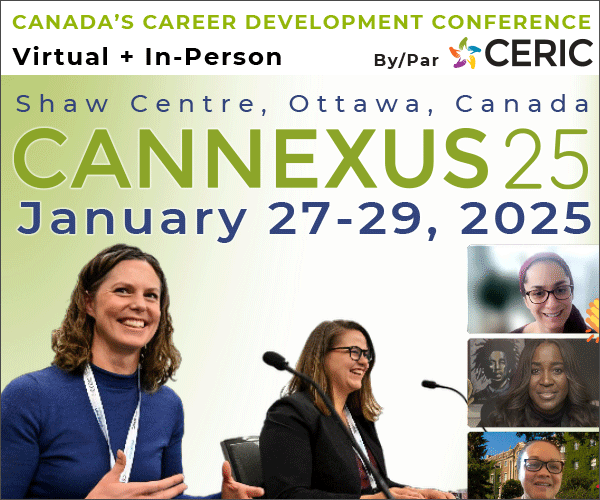Developing an Industry Job Simulation Program for Graduate and Postdoctoral Trainees in Life Sciences
DOI:
https://doi.org/10.53379/cjcd.2021.102Keywords:
experiential learning, job simulation, talent development, non-academic careers, life sciences, mentorship, coachingAbstract
In the life sciences, many graduate students and postdoctoral fellows find it challenging to enter the non-academic workforce after completing their programs. Through experiential learning, trainees can develop the knowledge, technical skills, soft skills, and project portfolio that employers value, and compete effectively in the job market. In this article, we share design considerations for developing a job simulation program based on our experience over five years with the Industry Team Case Study program at the University of Toronto. In this program, which is focused on the biopharmaceutical sector, trainees identify a business or policy challenge, conduct in-depth research, develop a solution to address the problem, and present their findings to industry professionals. For mentorship and coaching, trainees are matched with industry professionals. This article covers four areas of program development: starting the program, recruiting advisors and trainees, designing the program and project framework, and evaluating program effectiveness. Academic institutions and student organizations can use this information to start their own job simulation programs focused on their employment sector of interest. Employers can participate in these programs to develop and scout talent.
References
Archer-Kuhn, B., & Rancourt, D. (2019). How universities can really help PhD grads get jobs | University Affairs. https://www.universityaffairs.ca/opinion/in-my-opinion/how-universities-can-really-help-phd-grads-get-jobs/
BioTalentCanada. (2020). The Talent Differential The case for work-integrated learning in the bio-economy. https://www.biotalent.ca/wp-content/uploads/BioTalentCanada_LMI-The-Talent-Differential-09OCT2020-1.pdf
Brandt, P. D., Varvayanis, S., Baas, T., Bolgioni, A. F., Alder, J., Petrie, K. A., Dominguez, I., Brown, A. M., Stayart, C. A., Singh, H., Wart, V., Chow, C. S., Mathur, A., Schreiber, B. M., Fruman, D. A., Bowden, B., Holmquist, C. E., Arneman, D., Hall, J. D., … Layton, R. L. (2020). Measuring effects of trainee professional development on research productivity: A cross-institutional meta-analysis. BioRxiv. https://doi.org/10.1101/2020.09.28.316422
Council of Canadian Acadmies. (2021). Degrees of Success, Ottawa, Ontario: The expert panel on the labour market transitionof PhD graduates. isbn: 978-1-926522-85-2 (electronic book), 978-1-926522-84-2 (book)
Craig, R., & Markowitz, T. (2017). The Skills Gap Is Actually An Awareness Gap -- And It’s Easier To Fix. Forbes. https://www.forbes.com/sites/ryancraig/2017/03/17/the-skills-gap-is-actually-an-awareness-gap-and-its-easier-to-fix/#1f88f3d63ff4
Division of Student Life, University of Toronto. (2020). Centre for Community Partnerships. https://studentlife.utoronto.ca/department/centre-for-community-partnerships/
Edge, J., & Munro, D. (2015). Inside and Outside the Academy. The Conference Board of Canada.
Fuhrmann, C. N., Halme, D. G., O’Sullivan, P. S., & Lindstaedt, B. (2011). Improving graduate education to support a branching career pipeline: Recommendations based on a survey of doctoral students in the basic biomedical sciences. CBE Life Sciences Education, 10(3), 239–249. https://doi.org/10.1187/cbe.11-02-0013
Her, S., Jacob, M. D., Wang, S., Xu, S., & Sealey, D. C. (2018). Non-academic employability of life science PhDs: the importance of training beyond the bench. BioRxiv. https://doi.org/10.1101/485268
Hitchcock, P., Mathur, A., Bennett, J., Cameron, P., Chow, C., Clifford, P., Duvoisin, R., Feig, A., Finneran, K., Klotz, D. M., McGee, R., O’Riordan, M., Pfund, C., Pickett, C., Schwartz, N., Street, N. E., Watkins, E., Wiest, J., & Engelke, D. (2017). The future of graduate and postdoctoral training in the biosciences. ELife, 6, 1–7. https://doi.org/10.7554/eLife.32715
Langin, K. (2019). Private sector nears rank of top Ph.D. Employer. Science, 363(6432), 1135. https://doi.org/10.1126/science.363.6432.1135
Lenzi, R. N., Korn, S. J., Wallace, M., Desmond, N. L., & Labosky, P. A. (2020). The NIH “BEST” programs: Institutional programs, the program evaluation, and early data. FASEB Journal, 34(3), 3570–3582. https://doi.org/10.1096/fj.201902064
Meyers, F. J., Mathur, A., Fuhrmann, C. N., O’Brien, T. C., Wefes, I., Labosky, P. A., Duncan, D. S., August, A., Feig, A., Gould, K. L., Friedlander, M. J., Schaffer, C. B., Van Wart, A., & Chalkley, R. (2016). The origin and implementation of the Broadening Experiences in Scientific Training programs: An NIH common fund initiative. FASEB Journal, 30(2), 507–514. https://doi.org/10.1096/fj.15-276139
Mitacs. (2020). Mitacs. https://www.mitacs.ca/en
Porter, S., Mol, L., Locher, J., & Johnston, M. (2017). UBC PhD Career Outcomes Graduates from 2005-2013. 1–44. http://outcomes.grad.ubc.ca/docs/UBC_PhD_Career_Outcomes_April2017.pdf
Reithmeier, R., O’Leary, L., Zhu, X., Dales, C., Abdulkarim, A., Aquil, A., Brouillard, L., Chang, S., Miller, S., Shi, W., Vu, N., & Zou, C. (2019). The 10,000 PhDs project at the University of Toronto: Using employment outcome data to inform graduate education. PLoS ONE, 14(1), 1–12. https://doi.org/10.1371/journal.pone.0209898
Roach, M., & Sauermann, H. (2017). The declining interest in an academic career. PLoS ONE, 12(9), 1–23. https://doi.org/10.1371/journal.pone.0184130
Schnoes, A. M., Caliendo, A., Morand, J., Dillinger, T., Naffziger-Hirsch, M., Moses, B., Gibeling, J. C., Yamamoto, K. R., Lindstaedt, B., McGee, R., & O’Brien, T. C. (2018). Internship Experiences Contribute to Confident Career Decision Making for Doctoral Students in the Life Sciences. CBE Life Sciences Education, 17(1), 1–14. https://doi.org/10.1187/cbe.17-08-0164
School of Graduate Studies, University of Toronto. (2020). Graduate Professional Skills Program Information Session. https://www.sgs.utoronto.ca/event/graduate-professional-skills-gps-program-information-session/
Sealey, D., Yung, A.,Rinchon,C., Wehrle, C. (2020). Case studies give grad students a chance to tackle industry challenges. University Affairs. https://www.universityaffairs.ca/career-advice/career-advice-article/case-studies-give-grad-students-a-chance-to-tackle-industry-challenges/
Silva, E. A., Mejía, A. B., & Watkins, E. S. (2019). Where do our graduates go? A tool kit for tracking career outcomes of biomedical PhD students and postdoctoral scholars. CBE Life Sciences Education, 18(4), 1–6. https://doi.org/10.1187/cbe.19-08-0150
Sinche, M., Layton, R. L., Brandt, P. D., O’Connell, A. B., Hall, J. D., Freeman, A. M., Harrell, J. R., Cook, J. G., & Brennwald, P. J. (2017). An evidence-based evaluation of transferrable skills and job satisfaction for science PhDs. PLoS ONE, 12(9), 1–16. https://doi.org/10.1371/journal.pone.0185023
Tomasson Goodwin, J., Goh, J., Verkoeyen, S., & Lithgow, K. (2019). Can students be taught to articulate employability skills? Education and Training, 61(4), 445–460. https://doi.org/10.1108/ET-08-2018-0186
University of Alberta. (2020). Career Mentoring Program. https://www.ualberta.ca/career-centre/programs-services/career-mentoring/index.html
University of Toronto. (2020). Graduate and Life Sciences Education. https://www.glse.utoronto.ca/
Wart, A. Van, O’brien, T. C., Varvayanis, S., Alder, J., Greenier, J., Layton, R. L., Stayart, C. A., Wefes, I., & Brady, A. E. (2020). Applying experiential learning to career development training for biomedical graduate students and postdocs: Perspectives on program development and design. CBE Life Sciences Education, 19(3), 1–12. https://doi.org/10.1187/cbe.19-12-0270
Yung, A., Rinchon, C., Wehrle, C., Sealey, D. (2019). Getting hired in industry – life science graduate students use case studies to get noticed by employers. OSF Preprints. https://doi.org/10.31219/osf.io/x6fny

Published
How to Cite
Issue
Section
License
Copyright (c) 2021 Canadian Journal of Career Development

This work is licensed under a Creative Commons Attribution-NonCommercial-NoDerivatives 4.0 International License.














